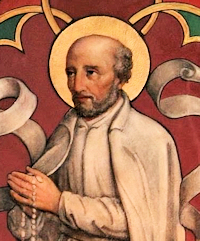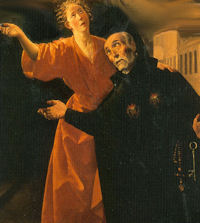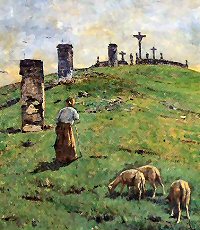Ordinary Time: October 31st
Tuesday of the Thirtieth Week of Ordinary Time; All Hallows' Eve
Other Commemorations: St. Quentin of Vermand, Martyr (RM); St. Alphonsus Rodriguez, Religious (RM) ; Other Titles: All Hallows' Eve; Halloween
» Enjoy our Liturgical Seasons series of e-books!
Today we celebrate the eve of All Saints. Pope Sixtus IV in 1484 established November 1, the Feast of All Saints, as a holyday of obligation and gave it both a vigil (known today as "All Hallows' Eve" or "Hallowe'en") and an eight-day period or octave to celebrate the feast. By 1955, the octave of All Saints was removed.
All Hallows' Eve
 Halloween or All Hallows' Eve is not a liturgical feast on the Catholic calendar, but the celebration has deep ties to the Liturgical Year. The three consecutive days — Halloween, All Saints Day and All Souls Day — illustrate the Communion of Saints. We, the Church Militant (those on earth, striving to get to heaven) pray for the Church Suffering (those souls in Purgatory) especially on All Souls Day and the month of November. We rejoice and honor the Church Triumphant (the saints, canonized and uncanonized) in heaven. We also ask the Saints' intercession for us.
Halloween or All Hallows' Eve is not a liturgical feast on the Catholic calendar, but the celebration has deep ties to the Liturgical Year. The three consecutive days — Halloween, All Saints Day and All Souls Day — illustrate the Communion of Saints. We, the Church Militant (those on earth, striving to get to heaven) pray for the Church Suffering (those souls in Purgatory) especially on All Souls Day and the month of November. We rejoice and honor the Church Triumphant (the saints, canonized and uncanonized) in heaven. We also ask the Saints' intercession for us.
The separate vigil and octave were abrogated in 1955, but Halloween evening marks the beginning of the observance of All Saints Day.
In England, saints or holy people are called "hallowed," hence the name "All Hallows' Day." The evening, or "e'en" before the feast became popularly known as "All Hallows' Eve" or even shorter, "Hallowe'en."
Since it was the night before All Saints Day, "All Hallows' Eve" (now known as Hallowe'en), was the vigil and required fasting, many recipes and traditions have come down for this evening, such as pancakes, boxty bread and boxty pancakes, barmbrack (Irish fruit bread with hidden charms), colcannon (combination of cabbage and boiled potatoes). This was also known as "Nutcrack Night" in England, where the family gathered around the hearth to enjoy cider and nuts and apples.
Halloween is the preparation and combination of the two upcoming feasts. Although the demonic and witchcraft have no place in a Catholic celebration, some macabre can be incorporated into Halloween. It is good to dwell on our certain death, the Poor Souls in Purgatory, and the Sacrament of the Sick. And tied in with this theme is the saints, canonized and non-canonized. What did they do in their lives that they were able to reach heaven? How can we imitate them? How can we, like these saints, prepare our souls for death at any moment?
For more information see Catholic Culture's Halloween page.
Also read from Catholic Culture's library:
- Halloween: Celebrate Like a Catholic by Jennifer Gregory Miller
- Halloween and All Saints Day by Father William Saunders
- Holyween: Reclaim The Celebration Of All Saints by Fr. Vincent Serpa, O.P.
- Catholics Give the Best Parties by Jeffrey Tucker
St. Quentin of Vermand
 Saint Quentin was a Roman, descended from a senatorial family. Full of zeal for the kingdom of Jesus Christ, he left his country and went into Gaul, accompanied by eleven other apostles sent from Rome. They separated to extend their campaign of evangelization to the various regions of France. Saint Quentin remained at Amiens and endeavored by his prayers and labors to make that region part of Our Lord's inheritance. By the force of his words and works he anticipated the glory of his martyrdom. He gave sight to the blind, vigor to paralytics, hearing to the deaf, and agility to the infirm, in the name of Our Lord, simply by the sign of the Cross. At all hours of the day, he invoked his God in fervent supplications.
Saint Quentin was a Roman, descended from a senatorial family. Full of zeal for the kingdom of Jesus Christ, he left his country and went into Gaul, accompanied by eleven other apostles sent from Rome. They separated to extend their campaign of evangelization to the various regions of France. Saint Quentin remained at Amiens and endeavored by his prayers and labors to make that region part of Our Lord's inheritance. By the force of his words and works he anticipated the glory of his martyrdom. He gave sight to the blind, vigor to paralytics, hearing to the deaf, and agility to the infirm, in the name of Our Lord, simply by the sign of the Cross. At all hours of the day, he invoked his God in fervent supplications.
But this apostolate could not escape the notice of Rictiovarus, the Roman prosecutor who at that time represented Maximian Herculeus in Gaul. Saint Quentin was seized at Amiens, thrown into prison, and loaded with chains. Rictiovarus asked him: How does it happen that you, of such high nobility and the son of so distinguished a father, have given yourself up to so superstitious a religion, a folly, and that you adore an unfortunate man crucified by other men? Saint Quentin replied: It is sovereign nobility to adore the Creator of heaven and earth, and to obey willingly His divine commandments. What you call folly is supreme wisdom. What is there that is wiser than to recognize the unique true God, and to reject with disdain the counterfeits, which are mute, false and deceiving?
When the holy preacher was found to be invulnerable to either promises or threats, the prosecutor condemned him to the most barbarous torture. He was stretched on the rack and flogged. He prayed for strength, for the honor and glory of the name of God, forever blessed. He was returned to the prison when the executioners who were striking him fell over backwards, and told Rictiovarus they were unable to stand up, and could scarcely speak. An Angel released the prisoner during the night, telling him to go and preach in the city, and that the persecutor would soon fall before the justice of God. His sermon, a commented paraphrase of the Apostles' Creed, has been conserved. To his profession of faith in the Holy Trinity, he added that Our Lord Jesus Christ, whom he adored, gave sight to the blind, hearing to the deaf, health to the sick and even life to the dead. At His voice, the lame leaped up and ran, paralytics walked, and water was changed into wine... He has promised to be forever with those who hope in Him, and He never abandons those who place their hope in Him; by His omnipotence, He delivers them, whenever it pleases Him, from all their tribulations. His guardians discovered that he had disappeared, though all doors were barred, and found him in the city preaching. They were converted by the prodigy. But Rictiovarus was furious and said to them: You, too, have become magicians?
Brought back before the tribunal as a sorcerer, Saint Quentin said: If by persevering in my faith, I am put to death by you, I will not cease to live in Jesus Christ; this is my hope, I maintain it with confidence. He was again placed on the rack and beaten, and tortured with other demoniacal means; his flesh pierced with two iron wires from the shoulders to the thighs, and iron nails were thrust into his fingers, his skull and body. Finally, this glorious martyr was decapitated, after praying and saying: O Lord Jesus, God of God, Light of Light..., for love of whom I have given up my body to all the torments... ah! I implore Thee, in Thy holy mercy, receive my spirit and soul, which I offer Thee with all the ardor of my desires. Do not abandon me, O most kind King, most clement King, who livest and reignest with the Father, in the unity of the Holy Spirit, forever and ever! His death occurred on October 31, 287.
His body was twice buried secretly, and twice it was rediscovered miraculously—in the years 338 and 641, first by Saint Eusebius of Rome, on a marshy island, where it had remained intact; later near the city of Augusta, by Saint Eloi. Saint Quentin remains in great honor in France above all, where more than fifty-two churches and as many localities were, at the beginning of the 20th century, dedicated to his memory; he is honored also in Belgium and in Italy. Charlemagne and the kings of France have gone to venerate the relics of Saint Quentin.
—Excepted from Les Petits Bollandistes: Vies des Saints, by Msgr. Paul Guérin
Often Portrayed As: bishop holding a roasting spit; a Roman soldier holding one or two spits; a deacon; man with a broken wheel; man with a chair to which he is transfixed; man with a sword; beheaded, a dove flying from his severed head.
Patronage: bombardiers; chaplains: locksmiths; porters; tailors; surgeons; against coughs; against sneezes; against dropsy.
Highlights and Things To Do:
- Read Dado's, bishop of Rouen, description of Quentin's martyrdom (scroll down to ----lacuna including c. 4----).
- Read more about St. Quentin:
- Have a glimpse of some of the images of a 12th century manuscript that depicted Quentin's martyrdom (site is in French). John Dillon has tracked down many different medieval images of St. Quentin.
- See Christian Iconography for a stained glass image of St. Quentin.
- St. Quentin's relics are found in the Basilica of Saint Quentin in Saint-Quentin, Aisne, France.
- The town and prison San Quentin in California are named after St. Quentin.
St. Alphonsus Rodriguez
 Saint Alphonsus Rodriguez was born in Spain in 1531, of a well-to-do commercial household of Segovia, the third of eleven children. When Alphonsus was eleven years old, he and his older brother were sent to a Jesuit college which had just been founded. He had already manifested great joy in serving the Jesuits when they had given a mission in Segovia and lodged in his father’s country home; now he rejoiced in the one year of study he was able to undertake, before the death of his father interrupted these pursuits. His brother, after certain affairs were settled, returned to school, but Alphonsus was obliged to remain at home, destined one day to replace his father.
Saint Alphonsus Rodriguez was born in Spain in 1531, of a well-to-do commercial household of Segovia, the third of eleven children. When Alphonsus was eleven years old, he and his older brother were sent to a Jesuit college which had just been founded. He had already manifested great joy in serving the Jesuits when they had given a mission in Segovia and lodged in his father’s country home; now he rejoiced in the one year of study he was able to undertake, before the death of his father interrupted these pursuits. His brother, after certain affairs were settled, returned to school, but Alphonsus was obliged to remain at home, destined one day to replace his father.
He accepted this lot and in 1557 married a virtuous wife; they were blessed with a daughter and two sons. But God intended to sanctify this soul of predilection by great and heroic sufferings. Only five years later he was already a widower, with only one little boy of three years remaining for him to raise. He believed this calamity must have come upon him for his sins, and he developed a great horror of sin; he asked God to let him bear even the torments of hell here below, rather than fall into a single mortal sin. He offered himself entirely to God, for whatever He might desire of him. Then he began a life of severe penance. A year later his mother died. He looked at his beautiful and innocent child, the only bond which still attached him to the earth; and he prayed to God that if ever that child should offend Him, to take him at once. His prayer was granted before long.
Alphonsus left Segovia and went to Valencia, where a Jesuit priest he had loved and admired earlier in Segovia was then stationed. This priest helped him to attain a loving confidence in God. He was thirty-eight years old when he requested his admission to the Order, but insufficient instruction and his unstable health, affected by his austerities, were regarded as obstacles. For two years he was employed as a preceptor of the young by two families of that city; finally, when he renewed his request for admission, he was accepted.
 His religious life was spent primarily as a porter in a Jesuit college on the island of Majorca; his interior life was a succession of moral tortures, borne with perfect humility and love of God. The demons would not leave alone this holy man who made it his joy to take upon himself all the most humble and fatiguing offices. He cast himself, as it were, into the abyss of the love of Jesus Crucified. Twice he was thrown down a cement staircase by the adjured enemies of man’s salvation; but his love for his crucified Saviour was proof against all such attempts on his virtue. He was afflicted with various illnesses, which plunged him into a sort of preliminary purgatory but did not change his life of effacement and service.
His religious life was spent primarily as a porter in a Jesuit college on the island of Majorca; his interior life was a succession of moral tortures, borne with perfect humility and love of God. The demons would not leave alone this holy man who made it his joy to take upon himself all the most humble and fatiguing offices. He cast himself, as it were, into the abyss of the love of Jesus Crucified. Twice he was thrown down a cement staircase by the adjured enemies of man’s salvation; but his love for his crucified Saviour was proof against all such attempts on his virtue. He was afflicted with various illnesses, which plunged him into a sort of preliminary purgatory but did not change his life of effacement and service.
In 1591 he was already 60 years old when he received an order to sleep thereafter in a bed; until then he had contented himself with a few hours of sleep on a table or in a chair. He served a chapel where the elderly or infirm fathers celebrated late Masses. He was told to write the story of his life, which work he began with hesitation in 1604. He was not spared the trial of being misunderstood and underestimated by a new Superior, but he found only joy and consolation in the public reproaches he received. He wrote in his book of maxims: “In the difficulties which are placed before me, why should I not act like a donkey? When one speaks ill of him — the donkey says nothing. When he is mistreated — he says nothing. When he is forgotten — he says nothing. When no food is given him — he says nothing. When he is made to advance — he says nothing. When he is despised — he says nothing. When he is overburdened — he says nothing... The true servant of God must do likewise, and say with David: Before You I have become like a beast of burden.”
The story of his association in his old age with Saint Peter Claver, the novice whose future mission he saw by a vision and foretold to him, is written into the annals of the Church in letters of gold; the two Saints were canonized together by Pope Leo XIII after more than two centuries.
Saint Alphonsus died in 1617; already he was known and loved as a Saint by the population. In 1825 he was beatified, and in 1888 Pope Leo XIII closed the inquiries after two new miracles had been verified, and proceeded to the ceremonies of canonization in Rome. The memory of Saint Alphonsus remains in benediction in the Order and in the hearts of those who know the value of the Cross of Christ and its perpetuity in His Mystical Body.
—Excerpted from Biography of Saint Alphonsus Rodriguez, text by Abbé L. Tabourier, in Un Saint pour chaque jour du mois
Highlights and Things to Do:
- Read more about St. Alphonsus:
- St. Alphonsus Rodriguez wrote some exellent books on the spiritual life called the Practice of Perfection and Christian Virtues in 3 Volumes. The set is available from the Carmelite Sisters.








